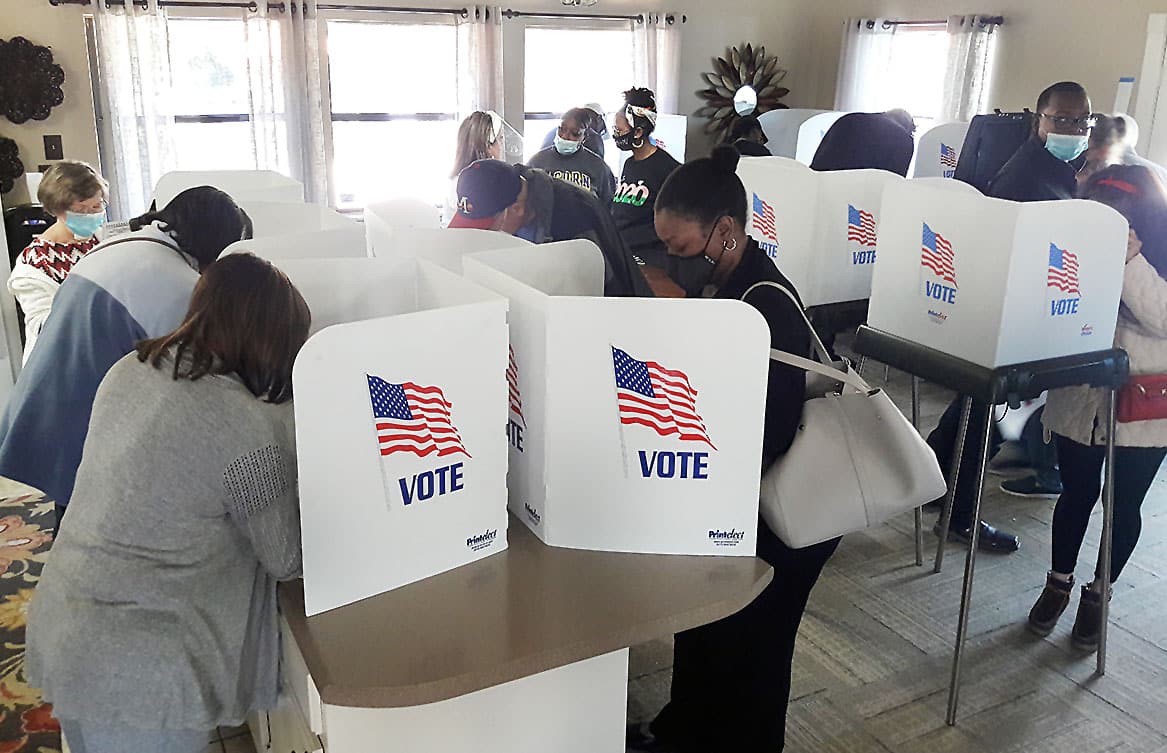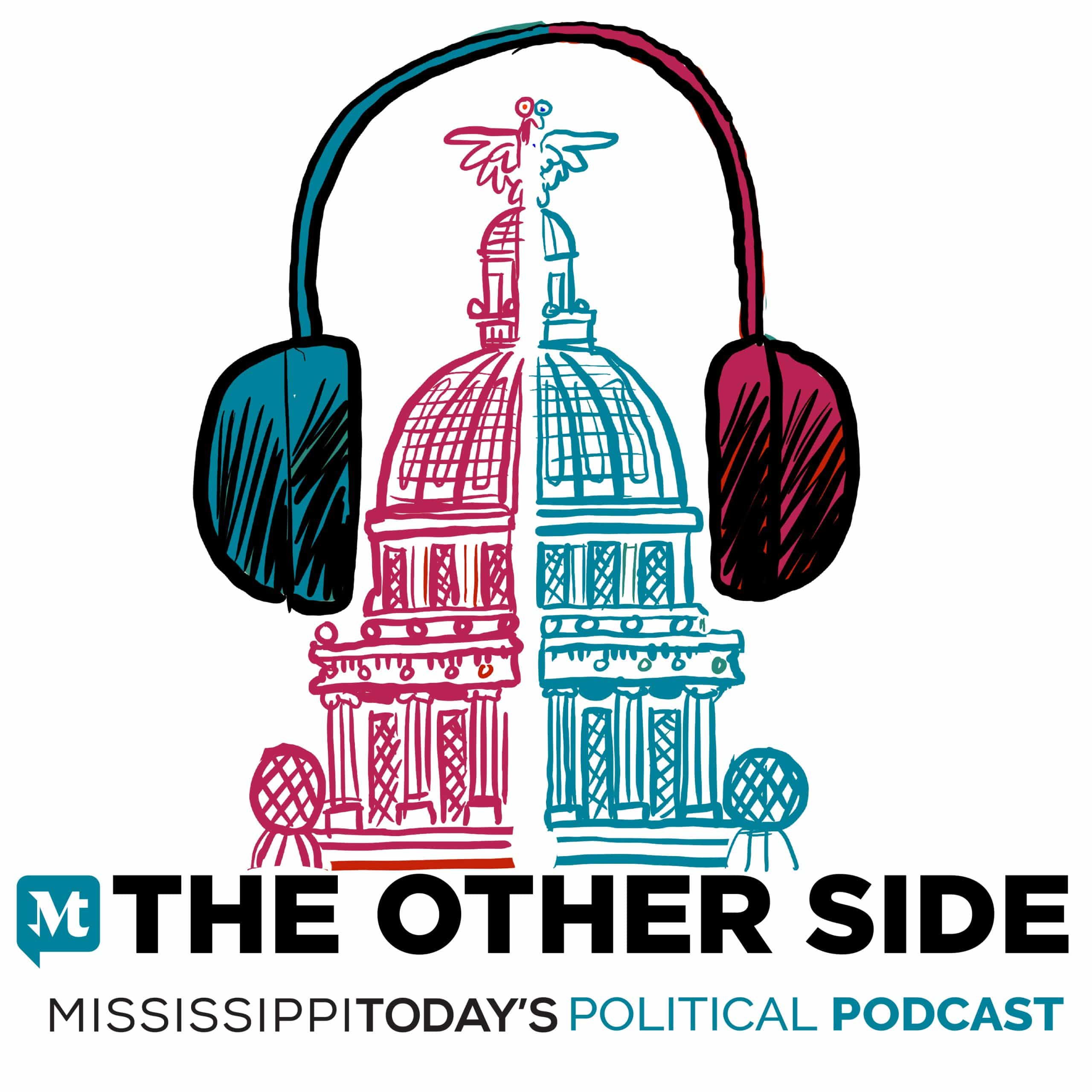Mississippi Today
The racist origins of runoff elections, which Mississippi may see in November governor’s race

A lot of people are closely watching for the possibility of a runoff election between Republican incumbent Tate Reeves and Democratic challenger Brandon Presley in the November contest for Mississippi governor.
People have reasons to be excited. After all, if a runoff should occur, it would be the first general election runoff in Mississippi history. And people nationally also should be excited. The runoffs for U.S. Senate seats in Georgia in 2020 and 2022 are the only runoffs to occur across the nation in recent years.
While the rarity of runoffs makes them exciting, it should not be forgotten that the genesis for modern day runoff elections can be traced to efforts after the Civil War to place barriers to African Americans voting and holding political office.
The reason general election runoffs are rare is that Mississippi and Georgia are the only two states to require them. Well, there is Louisiana that is unique because of the so-called jungle primary where there are no party primaries. All candidates there appear on the same ballot, and if no one gets a majority vote, the top two vote-getters advance to a second election.
But Mississippi and Georgia are the only states where a candidate in the general election must garner a majority of the vote, or 50% plus one, to win. If no candidate gets that majority in Georgia and Mississippi, the top two vote-getters advance to the runoff.
Here is how the runoff works: the winners of the Democratic and Republican primaries advance to the November general election. But also eligible to compete in the general election are third party candidates and independents. With more than two candidates on the ballot, there always is the possibility that in a close election, no candidate will win a majority of the vote.
Since independent candidate Gwendolyn Gray dropped out of the 2023 governor's race too late to have her name removed from the ballot, the possibility exists that neither Reeves nor Presley will obtain a majority of the vote on Nov. 7, resulting in a runoff election three weeks later on Nov. 28.
While Mississippi and Georgia, excluding the weirdness that is Louisiana, are the only states with general election runoffs, 10 mostly Southern states have runoffs in party primaries.
Only two non-Southern states have party primary runoffs: South Dakota and Vermont. In the non-Southern states, the conditions leading to a runoff seldom if ever occur, like in Vermont only if there is a tie.
The party primaries were put in place after Reconstruction as one of many efforts by the Southern states' white lawmakers to ensure that African Americans were not elected to statewide office.
Remember, in those days the Republican Party had little or no power in the South. For all practical purposes, the winner of the Democratic primary won the office. The white Southern power structure incorporated the party primary runoffs as an extra step in the process, believing it would be more difficult for poor Black voters to come to the polls a second time.
It is clear from the narrative of the day that efforts to prevent Blacks from holding public office was most often the intent of the runoff.
Two states — Georgia and Mississippi — added additional hurdles making it more difficult for Blacks to be elected to statewide office. In Georgia, there was a so-called county unit system, where candidates captured statewide elections by winning the most counties. The 159 Georgia counties were assigned electoral votes based on their size, and rural states had disproportionately more electors.
After the U.S. Supreme Court struck down the county unit system in the 1960s, Georgia created its current runoff system for general elections.
According to published reports, Denmark Grover, the then-Georgia legislator who played a key role in creating the runoff, did not try to hide his intent.
“If you want to establish if I was racially prejudiced, I was,” he said years later. “If you want to establish that some of my political activity was racially motivated, it was.”
And in Mississippi, the Legislature and ultimately the voters, at the urging of the federal judiciary, removed in 2020 another provision historically designed to keep African Americans from being elected to statewide office. That provision required a candidate for statewide office to garner a majority of the popular vote and win the most votes in a majority of the 122 House districts. If both of those goals were not achieved, the Mississippi House selected the winner.
While removing that provision from the state Constitution, the Mississippi Legislature in 2020 enacted another provision that has a history also steeped in racism: the runoff. And Mississippi, home to the highest percentage of Black residents in the nation, still has never popularly elected a Black candidate to statewide office.
In an interesting twist, in the recent Georgia runoffs, the candidates supported by a vast majority of Black voters — including one Black candidate, now-Sen. Raphael Warnock — prevailed.
This article first appeared on Mississippi Today and is republished here under a Creative Commons license.
Mississippi Today
Podcast: The controversial day that Robert Kennedy came to the University of Mississippi

Retired U.S. Bankruptcy Judge Edward Ellington talks with Mississippi Today's Bobby Harrison and Geoff Pender about former U.S. Attorney General Robert Kennedy's speech at the University of Mississippi less than four years after the riots that occurred after the integration of the school. Ellington, who at the time headed the Ole Miss Speaker's Bureau as a law school student, recalls the controversy leading up to the speech.
This article first appeared on Mississippi Today and is republished here under a Creative Commons license.
Did you miss our previous article…
https://www.biloxinewsevents.com/?p=359978
Mississippi Today
On this day in 1961
MAY 20, 1961

A white mob of more than 300, including Klansmen, attacked Freedom Riders at the Greyhound Bus Station in Montgomery, Alabama. Future Congressman John Lewis was among them.
“An angry mob came out of nowhere, hundreds of people, with bricks and balls, chains,” Lewis recalled.
After beating on the riders, the mob turned on reporters and then Justice Department official John Seigenthaler, who was beaten unconscious and left in the street after helping two riders.
“Then they turned on my colleagues and started beating us and beat us so severely, we were left bloodied and unconscious in the streets of Montgomery,” Lewis recalled.
As the mob headed his way, Freedom Rider James Zwerg said he asked for God to be with him, and “I felt absolutely surrounded by love. I knew that whether I lived or died, I was going to be OK.”
The mob beat him so badly that his suit was soaked in blood.
“There was nothing particularly heroic in what I did,” he said. “If you want to talk about heroism, consider the Black man who probably saved my life. This man in coveralls, just off of work, happened to walk by as my beating was going on and said ‘Stop beating that kid. If you want to beat someone, beat me.' And they did. He was still unconscious when I left the hospital.”
To quell the violence, Attorney General Robert Kennedy sent in 450 federal marshals.
This article first appeared on Mississippi Today and is republished here under a Creative Commons license.
Mississippi Today
2024 Mississippi legislative session not good for private school voucher supporters
Despite a recent Mississippi Supreme Court ruling allowing $10 million in public money to be spent on private schools, 2024 has not been a good year for those supporting school vouchers.
School-choice supporters were hopeful during the 2024 legislative session, with new House Speaker Jason White at times indicating support for vouchers.
But the Legislature, which recently completed its session, did not pass any new voucher bills. In fact, it placed tighter restrictions on some of the limited laws the state has in place allowing public money to be spent on private schools.
Notably, the Legislature passed a bill that provides significantly more oversight of a program that provides a limited number of scholarships or vouchers for special-needs children to attend private schools.
Going forward, thanks to the new law, to receive the vouchers a parent must certify that their child will be attending a private school that offers the special needs educational services that will help the child. And the school must report information on the academic progress of the child receiving the funds.
Also, efforts to expand another state program that provides tax credits for the benefit of private schools was defeated. Legislation that would have expanded the tax credits offered by the Children's Promise Act from $8 million a year to $24 million to benefit private schools was defeated. Private schools are supposed to educate low income students and students with special needs to receive the benefit of the tax credits. The legislation expanding the Children's Promise Act was defeated after it was reported that no state agency knew how many students who fit into the categories of poverty and other specific needs were being educated in the schools receiving funds through the tax credits.
Interestingly, the Legislature did not expand the Children's Promise Act but also did not place more oversight on the private schools receiving the tax credit funds.
The bright spot for those supporting vouchers was the early May state Supreme Court ruling. But, in reality, the Supreme Court ruling was not as good for supporters of vouchers as it might appear on the surface.
The Supreme Court did not say in the ruling whether school vouchers are constitutional. Instead, the state's highest court ruled that the group that brought the lawsuit – Parents for Public Schools – did not have standing to pursue the legal action.
The Supreme Court justices did not give any indication that they were ready to say they were going to ignore the Mississippi Constitution's plain language that prohibits public funds from being provided “to any school that at the time of receiving such appropriation is not conducted as a free school.”
In addition to finding Parents for Public Schools did not have standing to bring the lawsuit, the court said another key reason for its ruling was the fact that the funds the private schools were receiving were federal, not state funds. The public funds at the center of the lawsuit were federal COVID-19 relief dollars.
Right or wrong, The court appeared to make a distinction between federal money and state general funds. And in reality, the circumstances are unique in that seldom does the state receive federal money with so few strings attached that it can be awarded to private schools.
The majority opinion written by Northern District Supreme Justice Robert Chamberlin and joined by six justices states, “These specific federal funds were never earmarked by either the federal government or the state for educational purposes, have not been commingled with state education funds, are not for educational purposes and therefore cannot be said to have harmed PPS (Parents for Public Schools) by taking finite government educational funding away from public schools.”
And Southern District Supreme Court Justice Dawn Beam, who joined the majority opinion, wrote separately “ to reiterate that we are not ruling on state funds but American Rescue Plan Act (ARPA) funds … The ARPA funds were given to the state to be used in four possible ways, three of which were directly related to the COVID -19 health emergency and one of which was to make necessary investments in water, sewer or broadband infrastructure.”
Granted, many public school advocates lamented the decision, pointing out that federal funds are indeed public or taxpayer money and those federal funds could have been used to help struggling public schools.
Two justices – James Kitchens and Leslie King, both of the Central District, agreed with that argument.
But, importantly, a decidedly conservative-leaning Mississippi Supreme Court stopped far short – at least for the time being – of circumventing state constitutional language that plainly states that public funds are not to go to private schools.
And a decidedly conservative Mississippi Legislature chose not to expand voucher programs during the 2024 session.
This article first appeared on Mississippi Today and is republished here under a Creative Commons license.
-
Our Mississippi Home6 days ago
Beat the Heat with Mississippi’s Best Waterparks
-
SuperTalk FM3 days ago
State auditor cracking down on Mississippians receiving unemployment benefits
-
Kaiser Health News7 days ago
Medicaid ‘Unwinding’ Decried as Biased Against Disabled People
-
Mississippi News Video6 days ago
Jackson has a gang problem
-
Local News3 days ago
Family files lawsuit after teen’s suicide in Harrison County Jail
-
Mississippi Today5 days ago
On this day in 1950
-
228Sports6 days ago
George County Pours Runs In 6A South State Title Victory At PRC
-
Our Mississippi Home3 days ago
Deer Fly Season on the Coast – Oh My!









































